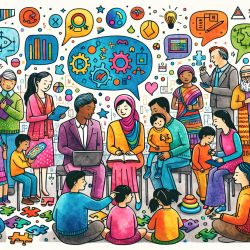Autism is a global concern, yet our understanding of its prevalence and treatment is predominantly derived from high-income countries (HICs). The recent research article "The Unmasking of Autism in South Africa and Nigeria" provides critical insights that can help practitioners improve their skills and approaches in these contexts. Here, we will discuss the key findings and their implications for practitioners.
Prevalence and Incidence
The research indicates that autism prevalence is rising globally, including in South Africa and Nigeria. However, the lack of large-scale epidemiological studies and diagnostic challenges contribute to underreported prevalence rates in these regions. Practitioners should:
- Advocate for more comprehensive epidemiological studies to understand autism's true prevalence.
- Recognize the importance of early identification and advocate for routine developmental monitoring.
Identification and Assessment
Early identification can significantly improve long-term outcomes for children with autism. The World Health Organization promotes developmental monitoring to ensure early identification. However, challenges remain, such as the lack of culturally sensitive and affordable tools. Practitioners should:
- Incorporate screening into routine health check-ups to identify at-risk children early.
- Use validated screening tools like the Modified Checklist for Autism in Toddlers Revised with Follow-up (M-CHAT-R/F).
- Advocate for the development of culturally and linguistically adapted tools.
Perspectives and Attitudes
Stigma and misconceptions about autism are prevalent in South Africa and Nigeria, even among healthcare professionals. This affects early recognition and intervention. Practitioners should:
- Increase awareness and education about autism within communities and healthcare settings.
- Work towards reducing stigma and promoting acceptance of autism.
Access to Supports and Services
Access to autism treatment is limited in both South Africa and Nigeria, exacerbated by late diagnoses and lack of awareness. Efforts are being made to improve early intervention through organizations and advocacy groups. Practitioners should:
- Promote early intervention programs and advocate for better funding and resources.
- Collaborate with advocacy groups to provide comprehensive support services.
Future Directions
Collaborative efforts between researchers, policymakers, healthcare professionals, and advocacy organizations are essential to bridge existing gaps. Practitioners should:
- Engage in ongoing research to develop contextually relevant interventions.
- Participate in awareness campaigns to destigmatize autism.
To read the original research paper, please follow this link:
The Unmasking of Autism in South Africa and Nigeria.










